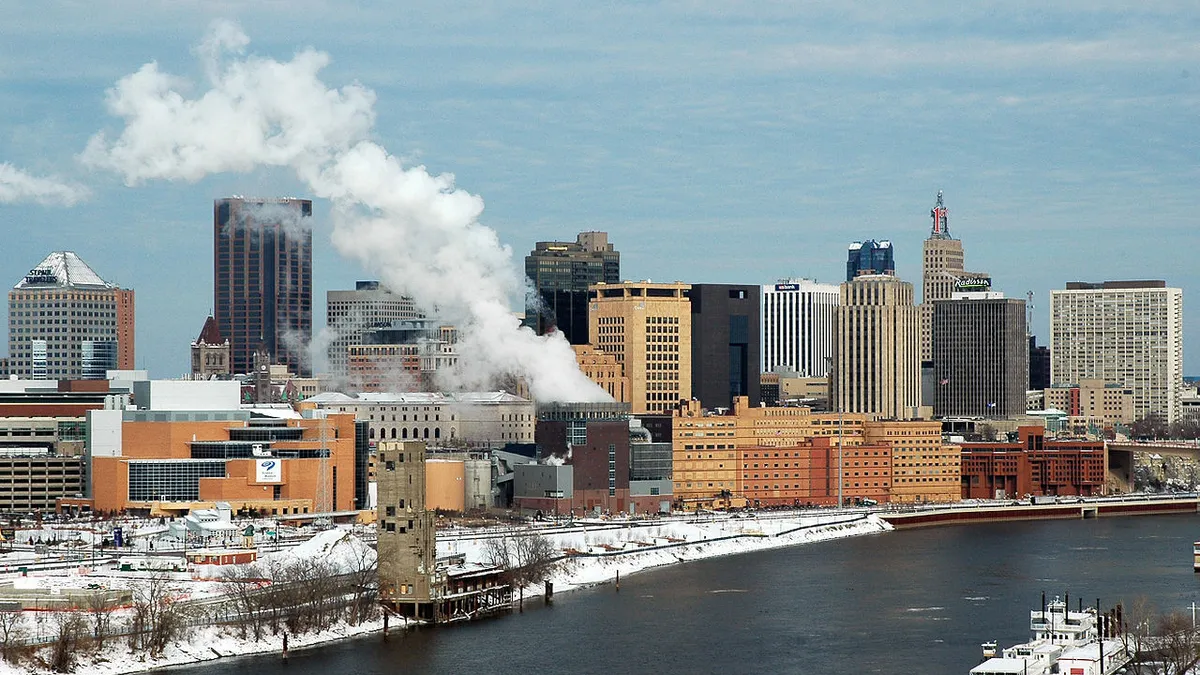Updated: June 29, 2019: The Minnesota Public Utilities Commission on Friday unanimously rejected CenterPoint's proposed renewable natural gas project. The commission cited several concerns including impact to ratepayers.
Several waste and biofuel groups as well as the city of Minneapolis supported the utility's proposal, but the Attorney General's office, the state's Department of Commerce, Division of Energy Resources and some clean energy groups objected to the project.
CenterPoint said it is still reviewing the order but would "assess next steps toward the filing of a revised petition. We remain committed to the importance of bringing a renewable natural gas option to our customers."
Dive Brief:
-
Centerpoint Energy filed a five-year pilot program proposal with Minnesota's Public Utilities Commission (PUC) on Thursday, which will give customers the option to purchase renewable natural gas, or biomethane, as an alternative to traditional gas.
-
The pilot would be the first of its kind to offer distribution of renewable gas directly to customers, although other utilities use it in a more "decentralized sense," Margaret Cherne-Hendrick, senior policy associate at Fresh Energy said in an interview with Utility Dive.
-
If approved, customers will be able to choose renewable gas for approximately $4 per therm, although the price won't be set until after the PUC approves the pilot, according to Centerpoint's website. The state's PUC is expected to make a final decision on the program in January of 2019.
Dive Insight:
In deciding the future of heating homes, electrification and biogas are viable, albeit more costly, alternatives to traditional gas. Utilities need to have a more thorough understanding about which option will get them closer to fulfilling emissions goals as well as "provide a reliable source of energy to customers," Cherne-Hendrick said.
Many in the industry will likely favor biomethane because the infrastructural transition is easier and cheaper for utilities she says. However, customers should be aware of what they're paying for.
Biomethane, while renewable, is not "clean energy," Cherne-Hendrick said. The gas, which comes from the digestion of landfill waste, manure, cornstalks or residue from wood and crops, is "25 times stronger than carbon dioxide," according to a 2013 study.
However, as utilities look to diversify fuel mixes, "biogas is certainly not unique for a fuel source that's being considered," she said. The concern, she adds, is that the mix has not been fully vetted as far as how it fits into greenhouse gas emissions standards in the U.S.
In a survey conducted by CenterPoint, the utility found half the approximately 1,550 customers surveyed were willing to pay $5 and $25 more per month for renewable gas, according to the Minneapolis Star Tribune, and the utility is operating under the assumption that 1% of its 800,000 customers would be willing to participate.
Ratepayers outside the program will still likely see an approximately $0.70 per year increase, the Star Tribune reports. The utility will also be asking the state for a return, since the program will "help the state meet its renewable energy goals."
Correction: An earlier version of this article incorrectly stated that biomethane is produced through burning landfill waste, manure, cornstalks or residue from wood and crops. Biomethane gas comes from the digestion of those materials. An earlier version also misstated the cost. It would cost approximately $4 per therm.














